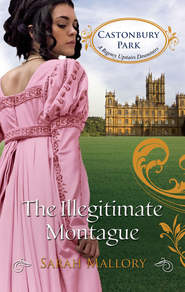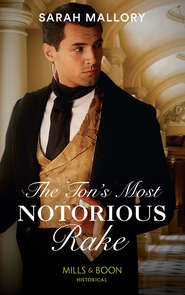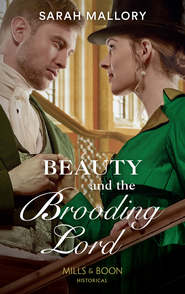По всем вопросам обращайтесь на: info@litportal.ru
(©) 2003-2024.
✖
More Than a Governess
Настройки чтения
Размер шрифта
Высота строк
Поля
Chapter Two
Later that afternoon Juliana put on her best walking dress of holly green with its matching bonnet and set off for Burlington Street. She was fortunate that the rain had stopped, but it remained overcast, and a chill wind stung her cheeks. Following Lawrence’s directions, she found herself staring up at an imposing double-fronted façade. For a moment her courage failed her. Then, squaring her shoulders, she marched up to the front door and knocked loudly.
‘Oh, come along, Juliana Wrenn,’ she muttered to herself. ‘He can’t eat you, after all.’
A liveried footman admitted her to the house and showed her into a small study on the ground floor while he went off to carry her message to his master.
Too nervous to sit down, she stood in the middle of the room and looked about her. The walls were lined with oak panels from floor to ceiling in the same manner as her cousin’s drawing room, but there all similarity between the two houses ended. The panelling in Major Collingham’s study gleamed and several lively hunting scenes hung on the walls. She was just wondering if any of the figures depicted could be the master of the house when a deep voice sounded behind her, making her jump.
‘You wished to see me, madam?’
‘Oh—I did not hear you come in!’
‘I am sorry if I startled you,’ responded the Major, sounding not a whit remorseful.
Juliana looked at him. In her cousin’s hallway she had only seen the back of his head. Now, staring up into the harsh, unsmiling face, her spirits began to fade. He was very tall, and dressed with military precision—there was nothing of the dandy about him, she noted with approval; the long limbs encased in buff-coloured pantaloons and black boots hinted rather at the athlete. His blue coat fitted perfectly about his broad shoulders and the crisp whiteness of his shirt and cravat enhanced his dark complexion, tanned by years in the sun—she knew he had been a soldier, and guessed he had seen action in the Peninsula. His bearing was upright and looked as solid and unyielding as his countenance. His voice, when he spoke again, was tinged with impatience.
‘Well, madam, what can I do for you?’
‘I—I came because—because you require a governess.’
Her words came out in a rush.
‘Then it is my secretary, Brasher, you should see. I made it quite clear in the advertisement.’
He turned to go.
‘Oh, I have not seen the advertisement—and it is you I wish to see, Major Collingham.’
He stopped and turned to face her.
‘Not seen the—then how the devil…?’
His frown was not encouraging, but she screwed up her courage—she must do this for Thomas and Amy’s sake.
‘I am a cousin of Mr Pettigrew, the lawyer. I overheard your conversation with him this morning, about requiring a governess urgently. It—it is a fortunate circumstance for you, sir, that I am looking for just such a post.’
‘I see. Well, if that is the case, I am of course delighted that you have come, but my secretary can handle the details—’
‘But I do not wish to talk to your secretary, Major.’ She swallowed. ‘I—I want to talk to you about my terms.’
The Major raised his black brows.
‘Terms?’
‘Yes.’ She drew a breath and put up her chin. ‘I believe you require a governess to take up the post immediately, sir. Well, I am free to do that, upon condition.’
The Major stared at her. Juliana returned his gaze steadily, praying that he could not hear the rapid thudding of her heart. His countenance relaxed a little.
‘I see this is not going to be the work of a moment.’ He moved to his desk. ‘Pray will you not be seated, miss…?’
‘Miss Wrenn, Major.’ She sat down on the edge of the chair, facing him.
‘Well, Miss Wrenn, it is true that I am in need of a governess, but, as the employer, I was of the opinion that it was my place to set the conditions.’
She did not flinch from his hard gaze. Mrs Churwell had told her to have faith in herself, and she must do just that.
‘In the normal course of events, yes, but you do not appear to be having much success; you told my cousin you would pay a king’s ransom for a governess who could—ah—stay the course was your term, I think?’
He laughed suddenly, and the rather harsh lines of his face softened into something much more attractive.
‘Quite right, Miss Wrenn, I did. Very well, why do you think you would suit my requirements?’
‘Because I have had an excellent education, I am used to dealing with children and can teach them all the usual accomplishments of reading, writing, a little arithmetic and geography, the use of globes; my French and Italian are very good, I play the pianoforte and the harp, I paint and draw, I am a skilled needlewoman and—’
‘And you are desperate for employment.’
She blinked.
‘You do not deny it, Miss Wrenn.’
‘No, sir.’ She looked him in the eye and said with more confidence that she was feeling, ‘But I have imp—impeccable credentials.’
He sat back, folding his arms across his chest and fixing her with a hard stare.
‘You are very young for such a post.’
‘I am one-and-twenty, sir.’
‘What is your experience?’
She clasped her hands in her lap.
‘I was educated in a select seminary in Clapham until I was seventeen years old, and had some teaching of the younger girls while I was there. I learned all the usual accomplishments, and was especially good at languages—a gift from my father, I think. My mother’s demise made it necessary for me to come home and for the past four years I have had the care of my brother and sister.’
‘And what has changed, that you must now seek employment?’
She looked down at her hands. It was not easy to admit her straitened circumstances to a stranger, but it must be done. ‘My father died a month since and all his effects were seized to pay his debts. That is why we are staying with my cousin, until I can find a way to support us all.’
‘And how old are your brother and sister?’
‘My brother is twelve years old, sir. My sister just nine.’ She looked up at the Major, but his face was impassive. She said, with a touch of defiance, ‘I am not looking for sympathy, sir.’
‘I have offered you none. You have been very frank, Miss Wrenn, so let me be equally open with you. I am a widower and have been so for the past eight years. My three children have been in the care of my mother—their grandmother—in Hampshire. Unfortunately, my mother died twelve months ago. Bonaparte had just escaped from Elba and it was impossible for me to leave my regiment at that time, so my sister took the children in; she lives nearby with her own young family. After Waterloo I was eager to settle my affairs and return to England, but it took me until a few months ago to complete my duties and get away.’ He paused and sat forward, resting his arms on the desk. ‘While in the care of my sister, my daughters were taught in the schoolroom with their young cousins, but I was naturally desirous to have the children with me, so I moved them back into Kewhurst, their old home, with a governess to look after them while I completed my business prior to taking them all to Lancashire. To date, as you pointed out to me, Miss Wrenn, I have been singularly unsuccessful in my choice of staff. The first governess lasted less than a week and left the house claiming that the place was haunted. The second I turned off when I discovered her addiction to strong liquor. The third, well, I thought she was settled, so I came on to London to put my affairs in order. I sent for the children to join me, and instead of the governess, they came with their aunt and their old nurse, and the information that the governess had discharged herself.’
‘Oh…dear.’
‘As you say, Miss Wrenn, oh dear.’











